Can chicken trigger cough

Does Eating Chicken Worsen Your Cough?
Ask yourself this can you resist a warm and delicious bowl of hot chicken soup when youre down with a cough or cold? Chicken soup is a popular recommendation by healthcare providers because it reduces inflammation and helps you get rid of mucus easily. But the benefits of this soothing dish dont stop there.
Sipping chicken soup also strengthens your immune system against the invasion of bacteria and viruses. So, naturally, preparing the dish for yourself or an under-the-weather loved one is a no-brainer.
Traditional Asian families might beg to differ. In Malaysian Chinese households, a common belief is that you should abstain from eating chicken if youre coughing. And your mother would likely reply to your question why with a vague reply like, Dont question, just do.
Is it an old wives tale or is there some truth to the practice? And what food alternatives can help ease your cough? Read on to find out.
Eating Chicken While Having a Cough: Yay or Nay?
Traditional Chinese Medicine (TCM) makes a compelling argument on whether you should eat chicken if you have a cough.
Real Health Medical Senior Physician Brandon Yew
Food Alternatives That Can Help Ease Cough Severity

Eating cold, raw, oily, fried, fatty, spicy, sugary, and processed foods when experiencing a cough goes against TCM principles. The system of medicine also advises skipping and alcoholic and iced beverages while nursing yourself back to health.
So, what can you eat to ease a cough? Lets take a look at a few suitable alternatives.
Ginger
Coughing typically happens when you have a sore throat or bronchitis an infection of the main lung airways. These conditions result from your bodys immune response to an infection or irritant.
If its caused by the Cold pathogen, sheng jiang, ) can help relieve the by blocking inflammatory proteins from triggering pain, itching, or a burning sensation in your throat.
Lemon
The citrus fruit is rich in vitamin C. It can help boost the immune system, increase the production of white blood cells to fight off infections, and reduce a coughs duration.
A squeezed slice of lemon (ming, ) yields approximately 3.7 milligrams of vitamin C, while half a lemon can produce a whopping 9.3 milligrams! Its also the preferred option for treating a common cold or Lung Deficiency-induced cough.
Tangerine peel
Boasting a sharp and bitter taste, dried tangerine peel (chen pi, ) is often used to address a phlegmy cough and strengthen the Spleen and Lungs. The best way to use it is to soak the peel in hot water or drink it in a made with tangerine peel, lemon and brown sugar.
Snow fungus
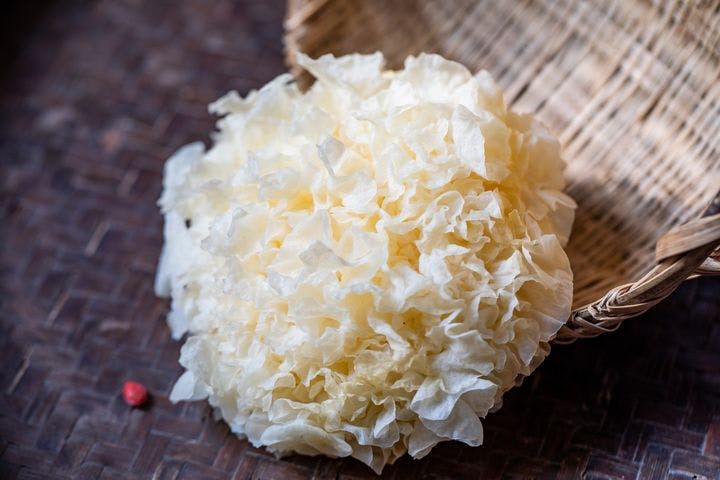
A species of mushroom that looks like a white or pale-yellow coloured coral in the water, snow fungus (xue er, ) is a common prescription for Lung Qi (vital life force) and Yin (passive energy) Deficiency symptoms, such as:
- A or dry cough with no phlegm
- A dry throat and cough due to smoking cigarettes
- A cough with bloody sputum
Chinese pear
Cooling in nature, Chinese pears (zhong guo li, ) can help ease a pathogenic cough or Lung-Deficiency-induced dry coughs, resolve phlegm and remove Excess Heat from the Lungs. To make a herbal tonic, boil four cups of water before adding the fruit, tangerine peel, and some almonds.
Allow the mixture to boil and reduce to two full cups before adding two to three tablespoons of honey (feng mi, ). Drink warm once or twice daily for one week.
Monk fruit
Commonly known as luo han guo(), monk fruit is highly prized for its abilities to maintain Lung health, treat Lung Yin Deficiency and alleviate chronic coughing. Simmer one piece of the fruit in water, strain, and enjoy the tea twice daily.
Eating chicken can help you recover from a cough, but only if Spleen and Lung cause the symptom. Take comfort in knowing that alternative food options can help relieve all types of coughs.
However, before making any significant changes to your diet, consult a licensed TCM practitioner to ensure the best possible outcome for you.
Have you used other remedies to relieve a cough? Tell us in the comment section below.
New Health Advisor
People cough in order to clear the lung airways of fluids, mucus, or other material, and a cough is often the most neglected symptom that many of us suffer from. A cough may be caused by an allergen, a cold, pollution, or tobacco smoke, and is regarded as a normal response by the body to clear the lungs. However, coughs don't always come from the lungs. Postnasal drip and acid reflux are also common causes of acute and chronic coughing that may be exacerbated by the food you eat.
Food to Avoid During Cough
1. Milk
 Phlegm is a thick, sticky mucus that flows down the back of your throat from an allergy or a cold. If coughing is the result of phlegm in your throat, avoiding foods that produce mucus can help relieve the problem. A protein from the milk during digestion stimulates excess mucus production in your intestines.Milk and other dairy foods could have a corresponding effect on the production of mucus in the respiratory tract, including the throat and lungs, especially when inflammation or infection is already present.If you are coughing, try avoiding milk to determine if that helps.
Phlegm is a thick, sticky mucus that flows down the back of your throat from an allergy or a cold. If coughing is the result of phlegm in your throat, avoiding foods that produce mucus can help relieve the problem. A protein from the milk during digestion stimulates excess mucus production in your intestines.Milk and other dairy foods could have a corresponding effect on the production of mucus in the respiratory tract, including the throat and lungs, especially when inflammation or infection is already present.If you are coughing, try avoiding milk to determine if that helps.
2. Food Allergens
 Some people suffer from a condition known as asthma that affects the lungs. The symptoms include coughing, wheezing, and shortness of breath. Known irritants, such as shellfish, milk, fish, nuts, yeast, and eggs, can cause a cough with those who have allergies associated with them. However, food to avoid during cough may also include carbonated drinks, prepared salads, and processed meats that trigger asthma attacks because of the chemicals included in those products. For those suffering from asthma, particular food allergens can trigger or make asthma that includes coughing symptoms worse.
Some people suffer from a condition known as asthma that affects the lungs. The symptoms include coughing, wheezing, and shortness of breath. Known irritants, such as shellfish, milk, fish, nuts, yeast, and eggs, can cause a cough with those who have allergies associated with them. However, food to avoid during cough may also include carbonated drinks, prepared salads, and processed meats that trigger asthma attacks because of the chemicals included in those products. For those suffering from asthma, particular food allergens can trigger or make asthma that includes coughing symptoms worse.
3. Caffeine
 If your cough is the result of a cold or flu, your health care provider may advise you to stay hydrated. Drinking plenty of fluids is important for recovery; however, caffeine is a diuretic that stimulates increased urination causing your body to dehydrate. Dehydration can also lead to a dry cough that when in contact with the acid in caffeine could lead to a more painful raspy cough. Caffeine is found in coffee, some cola or sports drinks, tea, and cocoa.
If your cough is the result of a cold or flu, your health care provider may advise you to stay hydrated. Drinking plenty of fluids is important for recovery; however, caffeine is a diuretic that stimulates increased urination causing your body to dehydrate. Dehydration can also lead to a dry cough that when in contact with the acid in caffeine could lead to a more painful raspy cough. Caffeine is found in coffee, some cola or sports drinks, tea, and cocoa.
4. Processed Foods
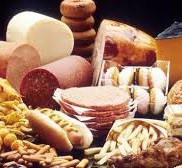 Your immune system fights infections and illnesses that lead to coughs and other symptoms, and poor nutrition inhibits your immune system, thereby suppressing its protective functions. Dont compromise your immune system with refined and processed food products. Processed food to avoid during cough includes packaged snacks and sugary desserts, baked goods, white pasta, white bread, and chips. Instead, choose foods that are nutrient dense and whole foods in order to boost your immune system.
Your immune system fights infections and illnesses that lead to coughs and other symptoms, and poor nutrition inhibits your immune system, thereby suppressing its protective functions. Dont compromise your immune system with refined and processed food products. Processed food to avoid during cough includes packaged snacks and sugary desserts, baked goods, white pasta, white bread, and chips. Instead, choose foods that are nutrient dense and whole foods in order to boost your immune system.
 5. Fried Foods
5. Fried Foods
The process of frying food releases an airborne irritant called acrolein. Reactions in the lungs can trigger coughing when a person is exposed to particular irritants in the air. Acrolein is known for triggering the cough reflex in those who are exposed to it, and can further aggravate a person who is already suffering from coughing spells. Try to avoid cooking fried foods when you have a cough to see if it helps.
6. Tobacco
 Scientists and doctors have revealed how environmental irritants such as tobacco smoke and the air pollution it causes can make people cough. Cigarettes are one of the leading causes of bronchitis in smokers and the second-hand smoke from tobacco has been known to cause medical problems in those around them. Not only does it irritate the lining of the throat, it can also delay recovery from illness, and increases your risk of cancer. If you smoke, consider quitting, or at least make sure that those around you are not subject to your second-hand smoke.
Scientists and doctors have revealed how environmental irritants such as tobacco smoke and the air pollution it causes can make people cough. Cigarettes are one of the leading causes of bronchitis in smokers and the second-hand smoke from tobacco has been known to cause medical problems in those around them. Not only does it irritate the lining of the throat, it can also delay recovery from illness, and increases your risk of cancer. If you smoke, consider quitting, or at least make sure that those around you are not subject to your second-hand smoke.
7. Mangoes, Bananas and Citrus Fruits
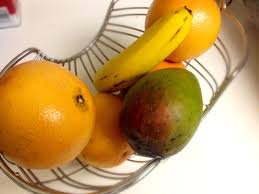 Food to avoid during cough also includes mango, banana and citrus fruits. Fruits with citric acid may cause acid reflux, aggravating your throat and triggering coughs, and the slimy nature of banana that has been chewed tends to exacerbate this condition. Mangoes also have a slimy texture, and those with asthma should avoid them altogether in case they have a hypersensitivity to them. Choose fruits that have a lot of water content, such as watermelon, pineapple, peaches and pears in limited quantities.
Food to avoid during cough also includes mango, banana and citrus fruits. Fruits with citric acid may cause acid reflux, aggravating your throat and triggering coughs, and the slimy nature of banana that has been chewed tends to exacerbate this condition. Mangoes also have a slimy texture, and those with asthma should avoid them altogether in case they have a hypersensitivity to them. Choose fruits that have a lot of water content, such as watermelon, pineapple, peaches and pears in limited quantities.
Foods to Eat with a Cough
For some people, coughing can be uncomfortable and annoying, but for others it can be quite distressing and can have a severe impact on their quality of life. Some comfort foods include:
1. Soup
Soup is good comfort food when youre ill. The soups warm liquid has an anti-inflammatory effect that soothes throat irritation and limits dry coughs. Micronutrients found in soup ingredients can strengthen the immune response and speed up recovery.
2. Spicy Food
The chemical responsible for much of the heat associated with spicy food is capsaicin commonly found in chili peppers. It acts as a natural expectorant for thinning mucus, and the intake of natural capsaicin (chilli) desensitizes the cough reflex and improves coughing.
3. Vitamin C
Vitamin C is an essential nutrient for the body's immune system. Although the body doesnt store vitamin C, increasing your intake may allow you a speedy recovery from a cough due to a cold or the flu. Foods that are high in vitamin C include broccoli, kiwi, bell peppers, and tomatoes.
5 Foods That May Trigger Asthma Flares
More than 25 million Americans have asthma, according to theCenters for Disease Control and Prevention (CDC). Inflammation and narrowing in the lungs is the primary cause of symptoms associated with the disease.
And while theres no evidence that any one diet will cure asthma, a growing body of research suggests that certain foods can worsen inflammation, and therefore the severity of asthma, according toMeredith C. McCormack, MD, an associate professor of medicine at Johns Hopkins Medicine in Baltimore.
The clinical evidence for dietary changes as a primary treatment for asthma is still evolving, but theres plenty of evidence that suggests a healthy diet is beneficial, Dr. McCormack says.
For example, according to a review published in 2017, there are certain foods that have pro- or anti-inflammatory effects, which means they may possibly help or hurt when it comes to asthma management.
McCormack says she works with her asthma patients to develop nutritional plans that alleviateasthma symptomsand support overall health.
Cassidy Gundersen, PhD, a nutritionist and the owner of Spiro Health and Wellness in Utah, says shes also worked with a number of people who were able to find long-lasting relief from asthma with dietary changes.
In addition to following a healthy diet, you might want to talk to your doctor about whether avoiding these five types of foods and drinks could help improve your asthma management. Remember, no dietary changes should be used in place of asthma treatment prescribed by your healthcare provider. If your symptoms are improving (or getting worse), talk with your doctor about adjusting your asthma treatment plan.
Chicken coughing? How to treat it?
HiI have just been given several adult laying hens, and these are my first experience with chickens. We noticed that one of them has been coughing, or at least it seems like that's what she's doing. Since we're so new at this, I don't really know what to look for as far as problems are concerned. The guy at the feed store says to give them antibiotics in their water for a week, and of course not eat the eggs at that time. Here's my questions: Is it possible to treat the chicken(s) in a more natural way, without antibiotics? And also, if we did have to use the antibiotics on the coughing one, should we also medicate them all as a precaution?Any suggestions? Thanks!!!!
Foods to Eat & Avoid During Cold and Cough for Babies, Toddlers and Kids
If your bundle of joy has a cold and cough, it must be really hard for you to see him suffer. Your child may have a poor appetite during this time and he may even refuse to eat. But not getting adequate nutrition can slow down his bodys natural response to fight infection. You must make sure that he eats the right food to get him immune system back on track. Read this article to find out which foods you can give (and avoid) to your child when he has a cold or cough.
Video: Foods to Eat or Avoid During Cold and Cough for Babies and Kids
Recommended Foods for Cough and Cold for Infants, Toddlers and Children
Giving nutritious foods to a baby which can be digested easily by him would be the best option. Here are some foods you should include in your childs diet if he has a cough or cold:
1. Breast Milk

If you have a newborn or a baby below six months of age, breast milk will be the only source of nutrition for him. Breast milk, being a good source of antibodies, can strengthen the immune system of a child. Check to see if your baby is congested before you start feeding your child, as congestion can prevent your infant from feeding adequately.
2. Barley Water
Suitable for infants who are at leastsix months old, barley water is a great remedy for fever, cold, and cough. However, it is not suitable for children with gluten allergy and caution must be exercised if a family member has such an allergy. This is because the allergy might have been passed on to your child and you could be still unaware of this fact.
3. Applesauce
Also known as stewed apples, these are easy-to-digest and can help a baby stay hydrated. They come in handy during a cough and cold as they replenish the bodys fluid supply.
4. Rice Water or Gruel
Recommended for babies who are above six months of age, rice gruel is a soothing home remedy for a cough and cold. Rice water boosts the immunity of a child thereby helping him combat any infection.
5. Sweet Potatoes
Sweet potatoes are a rich source of nutrients and strengthen the immune system. They also help the body in producing white blood cells.Sweet potatoescan be consumed in the form of porridge or you can mash and puree them for your little one aged six months and above.
6. Carrots
Carrots have medicinal properties and eating carrots can enhance the immune system and keep away bacteria and viruses. You can steam and mash the carrots to give it to your baby. You can also puree them or make carrot soup. However, give it your baby only if he is above six months of age.
7. Pomegranate Juice
The antioxidants inpomegranate juice can help subdue your childs cold. Make pomegranate juice and add a bit of pepper powder and dry ginger powder to it. Give it to your baby if he is 6 months or older. This juice will help provide him relief from a cold and cough.
8. Moong Dal Porridge
Moong dal porridge is a wholesome and fillingfood for babies suffering from cold. It can be given during lunch or dinner. Suitable for childrenseven months and older, it is a soothing dish that you little one will enjoy.
9. Curd Rice
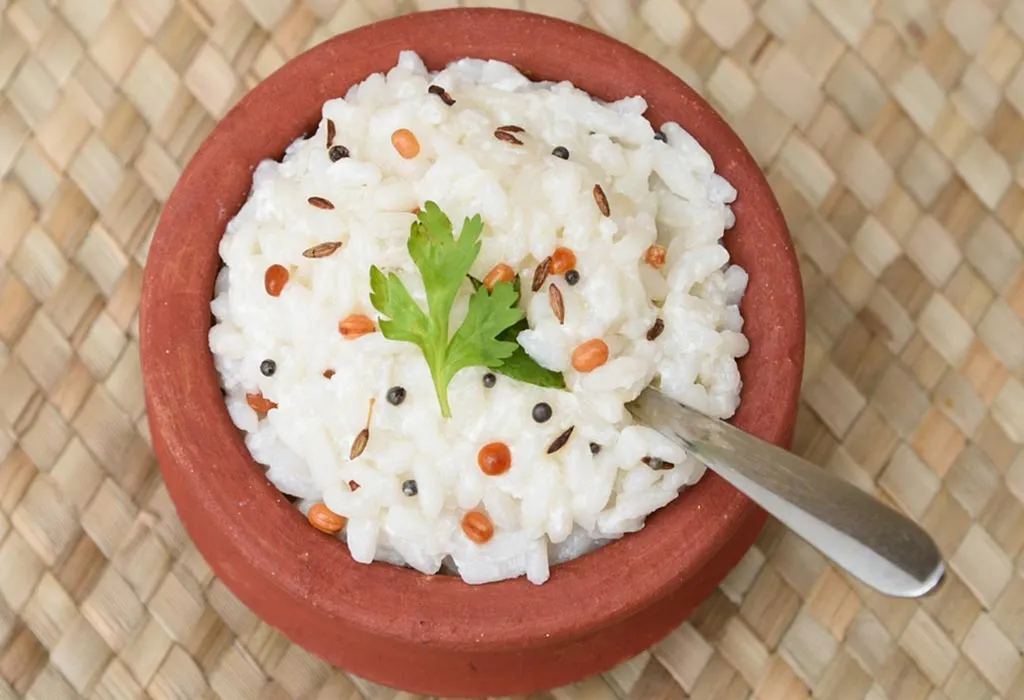
If your child is over eight monthsof age, you can feed him curd rice with a little seasoning ofginger and cumin seeds any time he is unwell. If your child has a cough or a cold, ensure that the curd you serve him is at room temperature and not too cold or sour.
10.Idli and Dosa
Steamed idli and dosa make great comfort food and can be given to kids when they are unwell and dont feel like eating. You can give idli or dosa at any time of the day to your child if he is eight months or older. You can also offer chutney or some homemade jam as a dip.
11. Sabudana Porridge
Sabudana is also known as sago; it is a good source of starch and can give your child a dose of energy. As it easy to digest, it is a preferred choice for children when they are sick. You can make sabudanaporridge, serve it with vegetables, or you can simply give the water. It is good for babies aged seven months or older.
12. Broccoli
Rich in antioxidants,broccoliis a good pick for combating infections. It energizes the bodys immune system and is suitable for children over eight months of age. You can make broccoli soup or puree for your little one. He will soon feel better.
13. Tomato Soup
Almost all of us like tomato soup; it is tasty and healthy. And the good thing is that it can be even given to children older than eight months of age. It constitutes a healthy dose of Vitamin C you can mix some mashed rice in it before offering it to your baby.
14. Mashed Potatoes
Mashed potatoes taste delicious and can be quite filling for a baby. Made from boiled potatoes, they usually appeal to children of all ages and can be introduced from eight months onwards.
15. Dalia
Being soft food, it can be swallowed easily, especially if a child has a throat irritation or pain. It can be made without milk to speed up the digestion process when a baby is sick. Dalia can be given to babies who are eight months and older.
16. Citrus Fruits
Drinking orange juice or lemon juice can help prevent cell damage while easing congestion and thinning out mucus. Make the juice with lukewarm water and add a dash of honey. It is generally recommended for children who are one year or above.
17. Turmeric Milk
A little turmeric powder mixed in warm milk with a dash of pepper acts as a natural antibiotic and can cure a cold as well asthroat infection in babieswho are one year or above.
18. Mushroom Soup
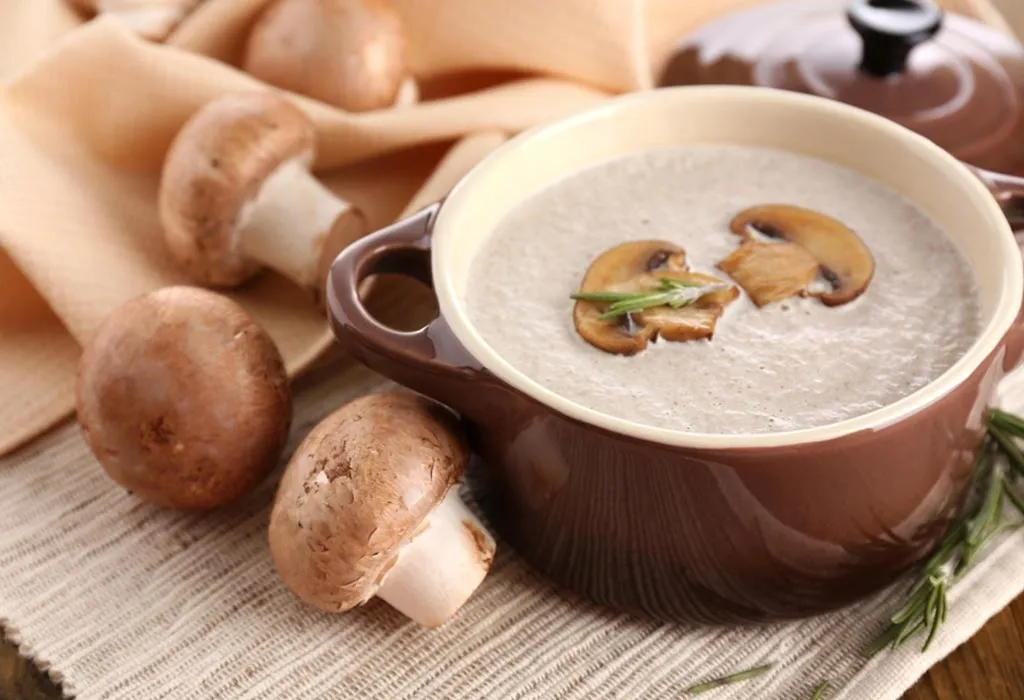
The health benefits ofmushrooms are plenty, and their ability to keep infections away is well known. You can give warm mushroom soup to your baby; it is great comfort food for toddlerswith acold and cough.It is usually given to children who have attained the age of one.
19. Poha or Beaten Rice
It is soft and can be chewed by babies easily. Poha is also easy-to-digest and makes for a filling meal, especially for a child who is unwell. You can give poha to your child if he is 1 year or older.
20. Tulsi Water
Tulsi or Indian basil can provide relief from a cold and cough. Boil a few leaves of tulsi in half a litre of water for about 5 minutes. Strain and give it to your child. You can give it to babies above 6 months of age.
21. Garlic Lentil Soup
Just like rice water, dal ka pani is good for babies. But if your baby has a cold and cough, you can give him garlic and lentil soup. Garlic has antiviral properties and can boost the immune system. Its antiviral properties can prevent infections and speed up the healing process.
22. Ajwain Water
Giving ajwain water can also relieve cough and clear chest congestion. Boil a tablespoon of carom seeds in water for some time. Let it cool then strain the liquid, then give it to your baby at regular intervals.
23. Bone Broth
Bone broth is made by simmering bones and connective tissue for several hours. It is rich in nutrients like collagen, which can help to support a healthy immune system. Bone broth can be served independently or used as a base for soups and stews.
24. Soup With Turmeric
Turmeric contains a compound called curcumin, which has anti-inflammatory and immune-boosting properties. For flavour and health benefits, you can add turmeric to soups, stews, and other dishes.
25. Oats
Oats are a good source of fibre, which can help to boost the immune system and reduce inflammation. They are also a good source of zinc, which is important for immune function. Serve warm oatmeal with cinnamon and honey for added flavour.
26. Chicken Soup
Chicken soup is a time-tested remedy for coughs and colds in adults and children. It is believed to reduce inflammation, soothe the throat, and provide essential nutrients that can help the body fight off infections. Chicken soup is easy to digest and provides much-needed hydration.
27. Ginger Tea
Ginger is known for its anti-inflammatory and immune-boosting properties. Ginger tea can help to soothe a sore throat, reduce coughing and congestion, and ease nausea. Simply steep fresh ginger in hot water and add honey to taste.
28. Honey
Honey is a natural cough suppressant that can help to soothe irritated throats and reduce coughing. It also has antimicrobial properties that can help to fight off infections. Add a teaspoon of honey to warm water or tea for children over one.
29. Yoghurt
Yoghurt contains live cultures that can help boost the immune system and fight infections. It is also a good source of protein, which is essential for building and repairing tissues. Choose plain yoghurt and add fresh fruit for flavour.
30. Berries
Berries such as strawberries, raspberries, and blueberries are rich in antioxidants that can help to reduce inflammation and boost the immune system. They are also a good source of vitamin C, which is important for a healthy immune system.
31. Cherry
Cherries are important for a healthy immune system. They are also a good source of fibre, which can help to reduce inflammation. Include cherry in your diet for good immunity.
32. Quinoa
Quinoa is a good source of protein, which is important for building and repairing tissues. It also contains fibre and vitamins that can help to support a healthy immune system. Serve quinoa as a side dish for dinner.
These are some recommended food for kids during cold and cough, which you can give and relieve.
Foods to Avoid During Cold and Cough
You should avoid including certain foods in your childs diet if he has a cold and cough. This is because some fruits and vegetables are likely to have a cooling effect and can lead to respiratory infections. These include:
1. Refined Sugar and Sweets
Too much sugar is not good for anyone, especially for babies and toddlers. Hence, sugar and sweets laden with sugar should not be given to a child with a cold or cough.
2. Dry Fruits and Nuts
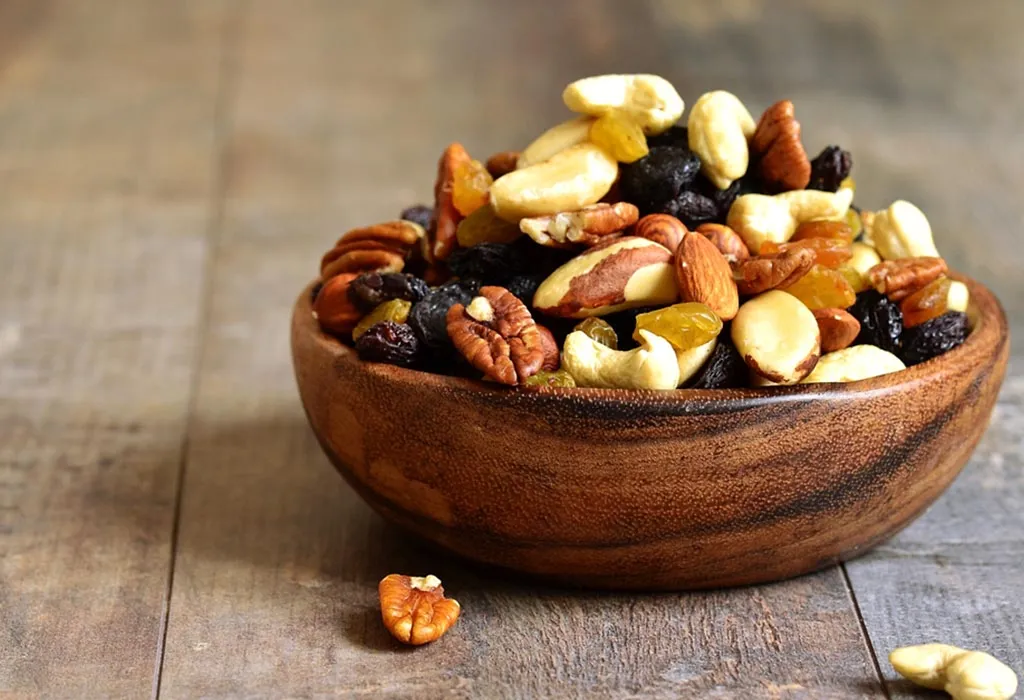
Your child may find it hard to chew or swallow dry fruitsandnuts if he has a cold or cough. There is also a risk of sticking pieces in his throat if he coughs while eating. So its best not to give dry fruits and nuts. However, you can give them in powdered form add the powder to his milk and porridge when he is sick.
3. Spicy and Oily Foods
Spicy or oily food can irritate the throat and worsen your childs cough and cold. Thus, it is best not to give them to your kiddo.
4. Dairy Products
Dairy products like milk, cheese, and yoghurt can thicken mucus and worsen cough and cold symptoms. Avoid giving dairy products to children who are experiencing cold and cough.
5. Processed Foods
Processed foods like chips, crackers, and pre-packaged snacks are often high in salt and preservatives, dehydrating the body and worsening cough and cold symptoms. Choose whole, unprocessed foods instead.
6. Fried Foods
Fried foods are high in fat and can be difficult to digest, worsening cough and cold symptoms. Avoid fried foods instead of baked, grilled, or steamed foods.
7. Sugary Drinks
Sugary drinks like soda and juice can dehydrate the body and weaken the immune system, making it harder for the body to fight off infections. Avoid sugary drinks and, instead, opt for water or herbal tea.
The above-mentioned food for babies in cold and cough should be avoided, and you will be good to go!
Tips to Feed a Child Suffering From a Cough and Cold
If your munchkin is unwell, he is bound to get cranky and may fuss while eating. Here are a few things you should keep in mind to make sure he gets the required nourishment:
- Babies six months and younger should be breastfed or given formula if they have a cold and cough.
- Babies 6 months and above should have frequent small meals instead of big meals thrice a day.
- If your babys doctor prescribesoral rehydration solution (ORS) to your toddler, give it to your child as and when required.
- If your baby does not want to eat something, give him what he wants. Do not force-feed your sick child.
- If your baby is above six months old, ensure he stays hydrated. Offer him different types of fluids. These can include water, milk, broth, and freshfruit juice made with slightly warm water.
You should follow these general guidelines if your child is down with a cold or cough. However, if there are symptoms like wheezing or ear pain, it is best to consult a doctor immediately, as it can be an ear infection or something more serious. Also, do not introduce new foods when your baby is ill, as these can aggravate the symptoms or cause allergies, worsening the matter. Consult your doctor if your childs condition doesnt improve over a few days. Since dehydration is possible because of infections, keep an eye on your child; note these early signs to ensure you can get your child the help he needs immediately.
References/Resources:
1. Colds in children; PubMed Central; https://www.ncbi.nlm.nih.gov/pmc/articles/PMC2722603/; October 2005
2. Foods and Drinks to Avoid or Limit; Centers for Disease Control and Prevention; https://www.cdc.gov/nutrition/infantandtoddlernutrition/foods-and-drinks/foods-and-drinks-to-limit.html; May 2022
3. Mayo Clinic Staff; Cold remedies: What works, what doesnt, what cant hurt; Mayo Clinic; https://www.mayoclinic.org/diseases-conditions/common-cold/in-depth/cold-remedies/art-20046403; June 2022
4. Sanu. A, Eccles. R; The effects of a hot drink on nasal airflow and symptoms of common cold and flu; Rhinology; PubMed; https://pubmed.ncbi.nlm.nih.gov/19145994/; December 2008
5. Rennard. BO, Ertl. RF, Gossman. GL, et al.; Chicken soup inhibits neutrophil chemotaxis in vitro; Chest; PubMed; https://pubmed.ncbi.nlm.nih.gov/11035691/; October 2000
Also Read:
How to Deal with Dry Cough in BabiesHome Remedies for Childrens Colds and FluCold and Cough Medicine for Infants and Children









